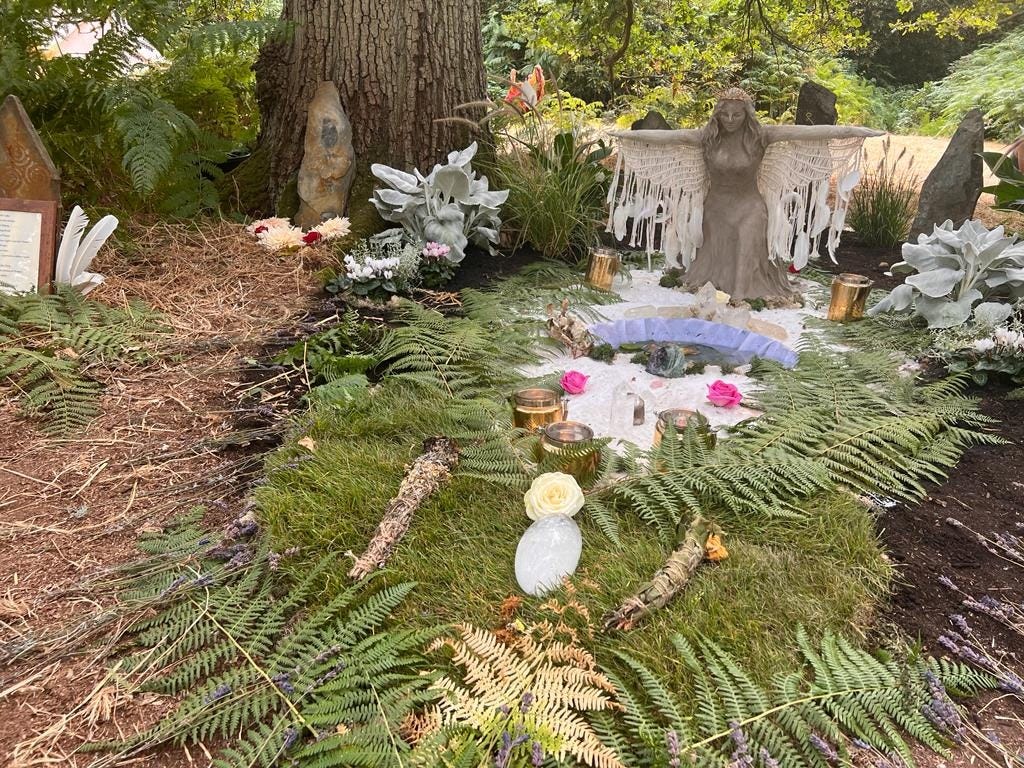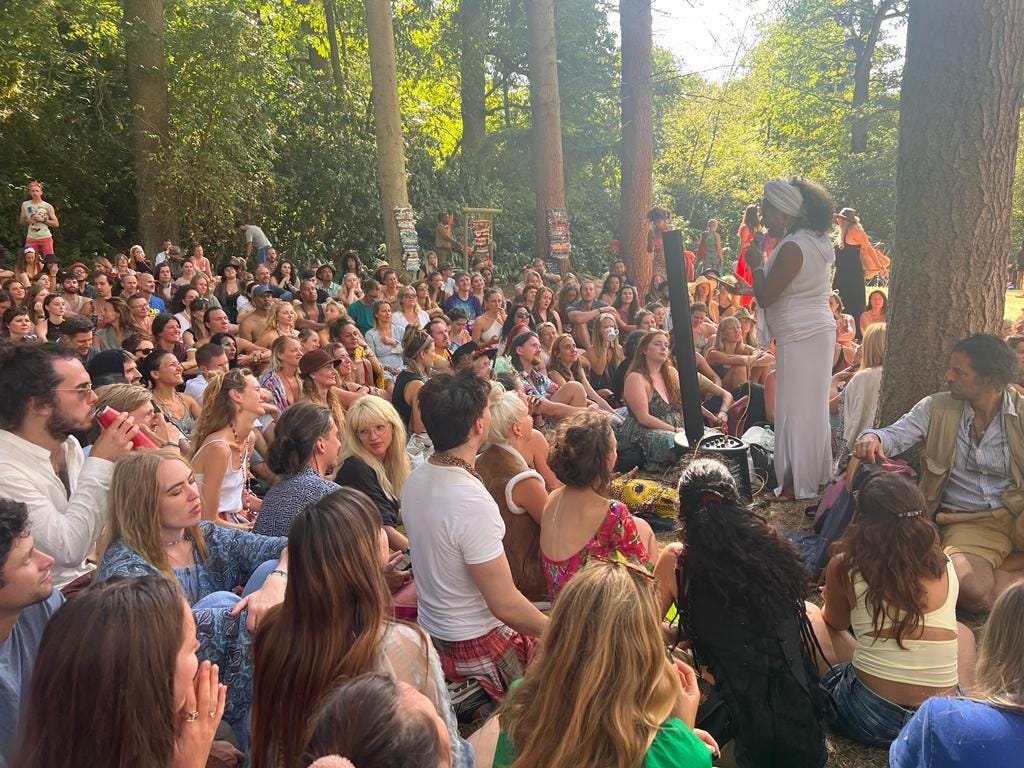Notes from Medicine Festival
What a transformational gathering in southern England can tell us about collective healing.
If you’d like to learn more about the Collective Trauma Summit 2022 (Sept. 28-Oct 6. online), here’s a 90-minute preview recorded by Thomas Hübl, Laura Calderón de la Barca, Ruby Mendenhall, Kosha Joubert and myself yesterday.
Resonant World #2
Thomas Hübl’s latest book is Healing Collective Trauma: A Process For Integrating Our Intergenerational and Cultural Wounds. The hardback copy kicking around our flat is well-thumbed. Key sentences are underlined with black biro, and fluorescent marker highlights slabs of text. Scraps of paper with phrases such as “Collective Shadow”, “Unintegrated Past” and “Hero’s Journey” scrawled in capital letters serve as bookmarks — relics of a book club I ran last year.
After returning home from Medicine Festival, a four-day gathering in the English county of Berkshire, on Monday, I leafed through the pages in search of a passage that would capture the essence of my experience.
In the final chapter, entitled “Vision of an integrating world,” Hübl compares the operating system of the societies we’re leaving behind to a glitching algorithm. It’s as if the burden of trauma accumulating in our collective psyche has grown so enormous that we can no longer properly function, triggering the crises erupting all around us. To enter a new era, Hübl writes, we need a “holistic upgrade”:
“We must leave behind our old scripts and unconscious programs and step into a more regenerative and emergent way of operating. Our role in the time ahead is to come together consciously and do the work required to shift these blocks, so that energy and information flow easily and fully…Small or large, near or far, our efforts in the endeavour actively work to free up massive stores of potential energy, locked away in the collective unconscious at the time of trauma. In this way, collective trauma integration initiatives are like global acupuncture.”
Medicine Festival’s organisers don’t exactly bill the gathering as a “collective trauma integration initiative.” Nor have I heard them use the term “global acupuncture.” But I think the spirit of the festival aligns closely with Hübl’s vision, and I wanted to share some of my experiences there to help flesh out what that might look like in practice.
Fire and stars
Even starting to write about Medicine Festival, I notice a twinge of hesitation. Part of me is asking whether I’m going to sound too idealistic and starry-eyed about what is basically a fun gathering in a field. But there’s some core part of me that knows I came away feeling markedly more peaceful, grounded and inspired than when I arrived — and I’ve learned to trust that felt-sense more than my fear of sounding naive.
I’ve been going with my wife Genevieve and our four-year-old daughter since the festival started three years ago, and have loved it more every time. Held in a series of woodland clearings and fields at the Wasing Estate, the festival is small enough to be manageable but big enough to feel like you’re stepping into another world. No alcohol is served — which keeps the atmosphere clean and kids feeling safe. Sacred fires and beautifully-sculpted shrines anchor a palpable energy field that I’ve found both profoundly soothing — and at times challenging, because some mysterious current seems to bring up psychological baggage I’d been doing my best to avoid.
Medicine Festival was created to honor indigenous traditions — and welcomes elders, medicine carriers and spiritual teachers from the Brazilian Amazon; Tibet; Finland; West Africa; Peru; Australia; Suriname; Celtic tribes; the Lakota and many other communities besides. (The festival is run as a not-for-profit enterprise and any profits are used to support indigenous communities or regenerative environmental projects). The combined presence of all these wisdom keepers means that you can wander around all day and late into the night in an ambiance of ceremony, blessings, singing and the sound of drums, rattles, mbiras, flutes, guitars, didgeridoos and charangos. I find the effect transporting: as if a portal has opened up to a parallel dimension, not far from the M25.
The organisers emphasise the importance of learning from indigenous communities preserving what’s left of the planet’s biodiversity — and the values of reciprocity, harmony and respect for the natural world their traditions teach. Those concepts can sound at once like precisely the antidote to the ecological collapse, polarisation and mental health crisis generated by industrial civilisation — and somewhat fuzzy aspirations that might be hard to meaningfully operationalise in four days.
Temple Haze
In my experience, however, the power of Medicine Festival doesn’t arise directly from anything I learn from watching a ceremony or listening to a talk. For me, what’s so special about the gathering is the fact that so many of the participants are actively pursuing some form of healing path — and the supportive atmosphere that creates. There’s a basic consensus that we’re all struggling in different ways with the legacy of trauma — whether directly from our family and ancestral lines, or from living within the broader context of an economic and political system that’s blindly pushing us ever closer towards the precipice. The default assumption is that coming together in a space with workshops, movement, music and ceremony designed to help people connect at a deeper level can serve both our individual process — and perhaps a larger purpose. Those shared agreements — if not always explicitly stated — are precisely the kinds of foundations we’ll need to build on if we’re going to establish anything like Hübl’s vision for a trauma-integrating world.
The best way to experience this is to come to Medicine Festival next year (save money by watching for early bird tickets). But here’s a few examples of what I mean:
Group coherence — In collective trauma work, the concept of group coherence is key. The idea is that when people come together and begin to relate in a more intentional and transparent way, an intelligence begins to operate in the field of shared awareness that can’t be accessed by individuals working alone. This dynamic appeared to be at work throughout Medicine Festival — and particularly in the powerful group singing led by musicians of many traditions in workshops or around the sacred fires. Genevieve, for example, was utterly transported by a workshop led by the incredible Temple Haze. Check out this video of the singing on Instagram. Here’s Genevieve’s verdict:
“I’m not blown away by many people. But out of everyone I’ve seen, Temple Haze almost didn’t have an ego — he was almost invisible. There was something about him that was completely able to dissolve his egoic personality. He was singing deep from the soul. And unlike like a lot of singing workshops I’ve been to, there was a real balance between masculine and feminine — there were as many guys as there were women.”
Nature connection — Spending four days outdoors or under canvas, and largely away from screens, was a reminder of how much our systems benefit from unplugging.
Community — In March, I attended a week-long retreat in Germany run by Hübl as part of a two-year Timeless Wisdom Training programme. Within a very short time, the process work and deep sharing created an atmosphere where conversation flowed easily between strangers and people smiled a lot. Medicine Festival rapidly accomplished something similar. In each case, I was left with the same question: Why isn’t life always like this? A big part of the answer is the unacknowledged shadow cast by collective trauma.
Intentional use of psychedelics — Many people attending Medicine Festival may have at some point traveled overseas to attend retreats offering ceremonial use of psychedelics. (I went to one in the Netherlands in 2018). When used with respect and intention, these medicines can connect us with a felt experience of our true nature — untouched by trauma. This encounter with who we really are — at our core — provides a template we can use for profound healing.
We’re not separate — For a long time I was baffled by the kinds of concepts often trotted out in mystical texts: “We are all one. There is no separation.” What could such phrases possibly mean? At Medicine Festival, I felt a sustained experience of the truth of those statements — anchored in the cells of my body. I pray it never leaves me.
Shadow work — Generally speaking, the words “shadow work” — meaning a conscious effort to examine your own disowned traits — is not something you overhear that often, at least not in south-west London, where I live. At Medicine Festival, I kept catching the phrase drifting from half-overhead conversations. A small indicator, perhaps. But taking ownership of the parts of yourself that your ego would prefer to repress or deny is a big part of the work of integrating trauma — whether at the individual or collective level. If Medicine Festival can help the process reach critical mass, that’s a win.
Conscious discussions of sexuality — There were plenty of talks and workshops dealing with sexuality — including exploring blocks to intimacy; dynamics of submission and domination; and calling in queer ancestors, to name a few. Repressed sexual energy and sexual abuse are huge collective traumas — and we need more safe, well-held spaces where sex can be explored and discussed openly.
I should caveat all of the above by noting that I spent a lot of time at the festival dragging our daughter around in a wagon decorated with solar-powered fairy lights. (She loved the festival — though she did give a couple dressed as elves quizzical looks when they began smoking roll-ups). I didn’t manage to attend any of the talks or workshops. Mostly I enjoyed hanging out in an atmosphere that always felt friendly and at times was infused with a palpable quality of love. It was a huge privilege to be part of a community fortunate enough to have had an opportunity to unhook from the system for a few days to experiment with an alternative vision.
Of course, there’s no scientifically-mandated way to measure whether any “global acupuncture” was indeed performed at Medicine Festival. But there were moments among the trees, under the stars, and around the fires, when I felt reborn and timeless all at once. Old layers of conditioning, and the legacy of generations of accumulated collective trauma, gently — almost effortlessly — were falling away. I knew, without doubt, that my own process was never only about me, and that each time we heal, we contribute to the healing of the whole. A few days on from those moments, and I’m inclined to believe the festival’s motto: “The medicine you seek, is seeking you.”













My friend Louis Weinstock, author of a new book "How the World is Making Our Children Mad and What to Do About It: A field guide to raising empowered children and growing a more beautiful world", was also at the Fesitval, I think you will enjoy his post on his own experiences https://www.facebook.com/radicalalchemist/posts/pfbid02qC8QosUbLuBfEYaAbNj5n4wMTNSMMFzDq6SNocZUMMyKUoSCRXV9utkuctRdyrySl - I will highlight your post to him too.
Connecting a couple of words you mention reminded me of a book I have had very highly recommended to me "The Spirit of Intimacy: Ancient Teachings in the Ways of Relationships"
by Sobonfu Some (a West African Author). I haven't got around to reading it myself yet, but I think it could tie in well the Festival's themes and aims?